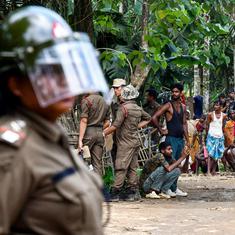Cauvery dispute: Madras HC permits farmers to stage one-day protest at Chennai’s Marina beach
Farmers’ leader P Ayyakannu, however, said the verdict was ‘of no use’. He and his group had originally sought permission for a 90-day hunger strike.

The Madras High Court on Saturday permitted farmers’ leader P Ayyakannu and his group to stage a one-day protest at the Marina Beach in Chennai over the non-formation of the Cauvery Management Board, ANI reported.
Ayyakannu had moved the High Court after the city police refused to let him protest at the beach. In his petition, Ayyakannu had said that he had planned a 90-day hunger strike on the Cauvery matter and it would attract attention only if it was held at Marina. During the course of the hearing, he had agreed to reduce his strike down to 30 days.
On Saturday, Justice T Raja observed that protests are carried out even near the White House, the official residence of the United States president, The News Minute reported.
Ayyakannu, however, expressed disappointment at the verdict. “The High Court has just granted us one day and that is of no use. We do not want to conduct any kind of symbolic protest,” he was quoted as saying. “We want to agitate till the board is formed. We will now consult our lawyers and seek further legal recourse in the matter.” The Chennai Police are also expected to appeal against the order.
Madras High Court allows farmer leader P Ayyakannu to stage protest at Marina beach for one-day over the issue of constitution of Cauvery Management Board.
— ANI (@ANI) April 28, 2018
During the previous hearing on April 25, Additional Advocate General of Tamil Nadu Arvindh Pandian had said that with the exception of the jallikattu protests in 2017, no protests had taken place at the beach since 2003. Pandian argued that the state provided permission only for rallies that last for less than two hours.
Ayyakannu had countered that he was being prevented from conducting a protest on Marina beach because the government feared it would attract attention like the jallikattu protests.
In response, the High Court had criticised the Tamil Nadu government and asked, “Is the Marina beach more important than Cauvery?” It had added: “On festival days like Vaikunda Ekadasi, Christmas and Ramzan, several lakh people go to worship at temples and churches. Will you say that you cannot control the crowds, so people should not celebrate those festivals?”
In an earlier hearing, Justice T Raja had told the petitioner to conduct a protest in a “dignified manner”, seemingly in reference to the protest held at Delhi’s Jantar Mantar in September, when farmers from Tamil Nadu ate human excreta and threatened to march nude to the prime minister’s office.
The verdict comes amid reports that the Centre has sought two weeks to form the board. On April 9, the Supreme Court had asked the Centre to file a draft scheme on the implementation of its February 16 verdict by May 3.
On February 16, the top court awarded its final verdict on the Cauvery water-sharing dispute, where it allotted 177.25 thousand million cubic feet of Cauvery water per year to Tamil Nadu and increased Karnataka’s allocation by 14.75 thousand million cubic feet per year. The court had directed the Centre to frame a scheme within six weeks of the verdict, which ended on March 29. Tamil Nadu has witnessed several mass agitations in the past two months over this dispute.









